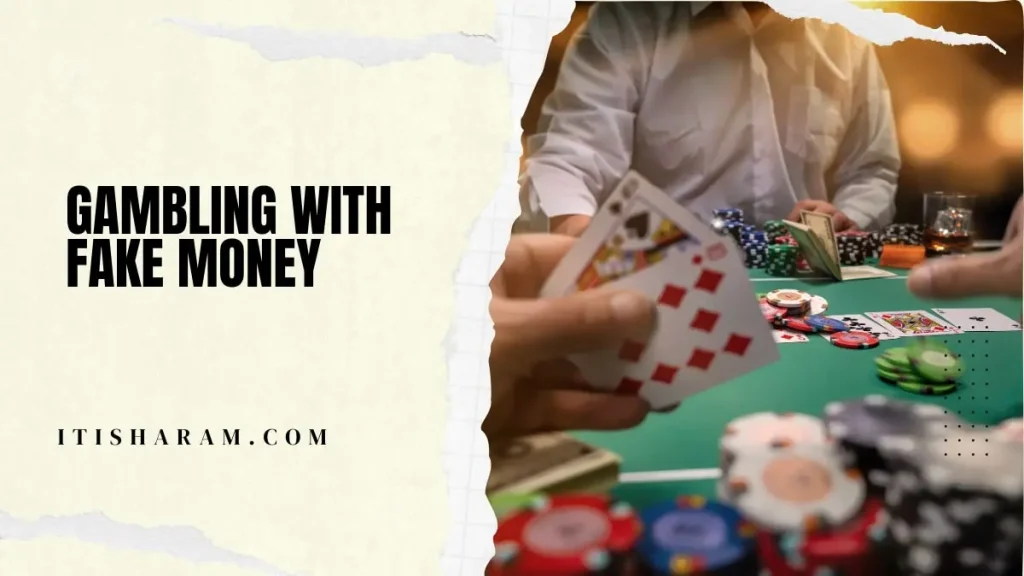Yes, it is haram to gamble with fake money. Because the best reason for gambling to be haram is that it creates chaos in society. If there is fake money it will create more confusion. So it is haram.
What is gambling?
Gambling is a game that hangs between profit and loss. Gambling involves a fixed amount of money or object (which is considered a prize).
After that, the two parties agree on a matter and determine the win-loss. The losing party pays the other party a predetermined sum of money or object. Gambling requires three elements—consideration (amount of bet), risk (chance) and reward.
Arabic synonyms for gambling are Maisir and Kimar. Maisir means accessibility. Gambling is so named because the wealth of others can be consumed very easily.
Kimar means the game of lose-win, betting, and risk-taking. Kimar is originally derived from kamar Dhatu, meaning moon. So named because wealth in gambling waxes and wanes like the moon. (Al Bahroor Rayek)
Shaykhul Islam Ibn Taymirah said, “Gambling is taking money from a person in such a way that he risks getting his money back.” [Majmul Fatawa 19/283]
According to some jurists, gambling is, “A game in which the winner takes something from the loser.”
There are different types and types of gambling
At present, there are various events for gambling in different countries. In some places, it is known as Houji and in some places, it is known as Green Table. Betting is also done in football and other sports competitions.
Apart from the ancient methods, many new methods of gambling have been invented. For example, flush, dice, betting on horse racing, playing cards, wheel spinning ring throwing etc.
All of these are forbidden. It is to be noted in the case of the prohibition of gambling that a mere change of name does not change the substance and original nature and ruling. Therefore, the rulings that applied to gambling in ancient times will apply to all types of gambling in modern times.
Fatwa on gambling with fake money
According to the definition of Shaykhul Islam Ibn Taymiyyah, if a certain amount of money (as a registration fee) is stipulated for participating in a competition, then that money transaction would be included in prohibited gambling. So it is forbidden.
Because the participant will be at risk here, whether he will get back the money he paid or not. Because there will be few winners. In this, they will benefit by getting rewards. But other payers will suffer financially.
Below are some fatwas issued in this regard:
- Ahkamul Zawaiz wal Musabaqat (Rules of Prizes and Contests), Author: Prof. Dr. Khalid Al Mushaiqih says,
The 1st type is, if the prize is awarded by payment of a fee to participate in the competition, this type of competition includes prohibited gambling.” [Ahkamul Zawaiz wal Musabaqat, first edition, date of publication 1434 AH-Dammam, Saudi Arabia]
- Dr Sheikh Nasser bin Saad As Shisri, a member of the Hayatul Kibaril Ulama or Senior Scholars Association of Saudi Arabia, said,
“It is not permissible for Ijma’s or scholars to participate in a contest in which all contestants pay a fee to participate and the prize is predetermined before the contest and the number of contestants are known.”
Why gambling is Haram?
In the Holy Qur’an, Allah Ta’ala mentions two wisdoms that gambling is Haram. One. Gambling creates hatred and enmity among people. Two. Prevents Allah from dhikr and prayer.
Allah Ta’ala says, ‘Satan wants to sow the seeds of enmity and hatred among you through alcohol and gambling and to stop you from dhikr of Allah and prayer. So will you refrain from these things?’ (Surah Ma’idah: 91)
Apart from this, scholars have given some other arguments behind the prohibition of gambling. For example –
- The national economy is adversely affected as the portion of state wealth that is in the hands of gamblers is not invested in the productive sector.
- Gambling addicts are prone to diseases such as laziness, apathy, etc., which are a serious threat to productivity.
- Due to gambling, many people become proletariat in an instant. Due to this, they get involved in socially destructive crimes like theft, robbery etc. Many commit suicide.
- A person addicted to gambling gets involved in various vices including drug abuse, and adultery.
FAQs
Is using fake money for gambling permissible in Islam?
Some scholars argue that using fake money for gambling is still haram because it promotes the same behaviours and attitudes as real gambling, such as greed, deception, and risk-taking. Others may consider it less severe since there is no actual financial loss involved.
What are the main concerns with gambling in Islam?
Gambling is generally prohibited in Islam because it involves wealth being transferred without any productive effort, which contradicts the principles of fairness, justice, and responsibility in Islamic economics. It also often leads to addiction, financial ruin, and social problems.
Does the intention behind using fake money for gambling matter?
Intention does play a role in Islamic jurisprudence (fiqh). If someone uses fake money for gambling purely for entertainment without any intention of gaining material benefit or causing harm, some scholars might consider it less reprehensible. However, others may argue that the harmful consequences of gambling persist regardless of intention.
Can using fake money for gambling lead to real gambling?
There is a concern that engaging in simulated gambling with fake money might desensitize individuals to the moral and ethical implications of gambling, potentially leading them to engage in real gambling later on. This is especially relevant in the age of online gaming and gambling apps.
Are there any circumstances where gambling with fake money might be permissible?
Some scholars may allow using fake money for educational purposes or as part of harmless games or simulations where there is no intention of financial gain or loss. However, even in such cases, caution should be exercised to ensure that the activity does not lead to real gambling or promote unhealthy attitudes towards wealth and risk.







